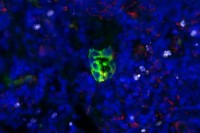
MSK Scientists Identify Potential New Strategy Against Metastasis
A team of scientists at the Sloan Kettering Institute has identified the STING cellular signaling pathway as a key player in keeping dormant cancer cells from progressing into aggressive tumors months, or even years, after they’ve escaped from a primary tumor.
In the Lab
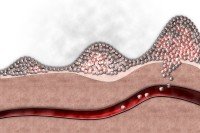
What Does Cancer Metastasis Have to Do with Wound Healing? More than You Might Think
Scientists are learning that — in a literal sense — metastasis is wound healing gone wrong.
Feature
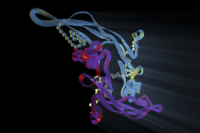
An Old Protein Gets a New Look: Researchers Target TGF-ß to Make Immunotherapy More Effective
Drugs that block the action of TGF-ß may make checkpoint inhibitors more effective.
MSK Heroes

Meet Ora Rosen, Who Solved Insulin’s Secrets and Galvanized Molecular Biology
In honor of Women's History Month, meet the scientific hero who helped build MSK's molecular biology program.
Feature

The Convergence: Scientists Move toward a New Understanding of Metastatic Cancer
Through converging lines of research in stem cell biology, tissue regeneration, and immunity, Sloan Kettering Institute scientists are learning what makes metastatic cancer cells tick.
Feature

Remembering Jerard Hurwitz, a Giant of Molecular Biology
MSK colleagues pay tribute to molecular biologist Jerard Hurwitz’s scientific accomplishments and passion for discovery.
In the Lab
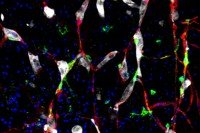
Scientists Identify Growth Signal for Metastatic Cancer "Seeds"
Targeting this signal with drugs might be one way to stop cancers from spreading.
In the News

Year in Review: The Science and Technology that Shaped Cancer Care in 2017
As 2017 draws to a close, take a look back at the scientific discoveries that deepened our understanding of cancer in the past year.
In the Lab

When Cancer Spreads: Research Focuses on Better Ways to Treat Metastasis
MSK investigators are learning how cancer cells escape from the original tumor and hide out in the body. Their goal is to prevent metastatic tumors from forming.
In the Lab

Inspired by a Patient, a Doctor Finds Answers for a Devastating Cancer Complication
Research is providing new clues about how cancer spreads to spinal fluid, a condition called leptomeningeal metastasis.
Announcement

News from #AACR16: Targeted Therapy Breakthrough, Improved Survival in Melanoma, and Benefits of Gut Bugs
Long-awaited results of clinical trials testing targeted drugs and immunotherapy combinations were on offer at the annual American Association for Cancer Research (AACR) conference.
In the Lab

Stealth Mode: How Metastatic Cancer Cells Evade Detection by the Immune System
Cancer cells have a sneaky ability to hide out in the body for years at a time. MSK scientists are looking for ways to flush them out.
In the Lab

Outsmarting Cancer’s Survival Skills
A new study led by MSK investigators reveals how some cancer cells become resistant to targeted treatment and suggests what might be done to stop that from happening.
In the Lab
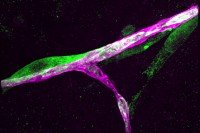
Holding On and Hiding Out: How Cancer Cells Spread to the Brain and Thrive
Researchers have gained new understanding of how tumors metastasize by studying the behavior of exceptional breast and lung cancer cells that are capable of entering the brain and surviving there.
Announcement

Cancer Biologist Joan Massagué Named Director of the Sloan Kettering Institute
Internationally recognized cancer biologist Joan Massagué has been named Director of the Sloan Kettering Institute. He was previously Chair of the Cancer Biology and Genetics Program at Memorial Sloan Kettering.
In the Lab

Study Links Cancer’s Ability to Spread with Chemotherapy Resistance
A team of investigators from Memorial Sloan Kettering has shown for the first time that tumor growth, metastasis, and chemotherapy resistance are connected to the same molecular changes inside breast cancer cells.
In the Lab
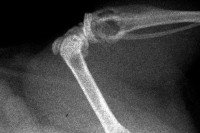
New Findings Clarify How Kidney Cancer Spreads to Distant Organs
Scientists have identified genes and biological mechanisms that one day could be targeted with drugs to stop kidney cancer from spreading to the bone, brain, or other organs.
Memorial Sloan Kettering Researchers Are 2010 Rock Stars of Science
Three Memorial Sloan Kettering Cancer Center investigators -- including the Center's new President, Craig B. Thompson -- have been featured with singer-songwriter Debbie Harry to lead the Geoffrey Beene Gives Back® 2010 Rock Stars of Science™ campaign in <i>GQ</i> magazine's December "Men of the Year" issue.
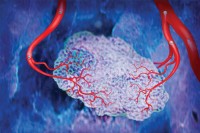
Circulating Tumor Cells May Spur Cancer by a Previously Unknown Mechanism
A recent Memorial Sloan Kettering study shows that some circulating tumor cells can circle back and infiltrate their tumor of origin, enhancing its growth and aggressiveness.

Opening Cancer's Black Box
The Metastasis Research Center has brought together 27 Memorial Sloan Kettering laboratories to facilitate research on metastasis and its treatment.

Researchers Find Genetic Key to Breast Cancer's Ability to Survive and Spread
New research led by investigators at Memorial Sloan Kettering Cancer Center sheds light on a genetic function that gives breast cancer cells the ability to survive and spread to the bone years after treatment has been administered.

Cancer Biologist Joan Massagué Honored on Two Continents
Joan Massagué, Chair of the Cancer Biology and Genetics Program in the Sloan Kettering Institute, has been named the recipient of two prestigious awards.

Genes Found to Play a Role in Breast Cancer's Spread to the Brain
New research led by investigators at Memorial Sloan Kettering Cancer Center identifies three genes that specifically mediate the metastasis, or spread, of breast cancer to the brain and illuminates the mechanisms by which this spread occurs.






















